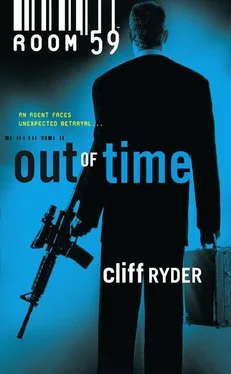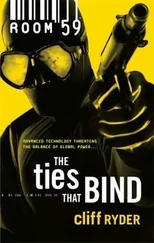“Thirsty?” Liang asked. He was watching Alex with cool curiosity. His smile was genuine, but Alex knew when he was being sized up.
“It’s been a long day. The flight in was rough, and I didn’t sleep too well the night before. I guess I’m more tired than I thought.”
“We’ll have just one more,” Liang said. “I was going to show you some of the city, but maybe we better concentrate on this one and get through it.”
Alex nodded. He glanced around the room.
“From the street you’d never guess this room was here. I thought for a minute you were going to try and get me out on a dance floor.”
Liang laughed again and took a swig of his beer. “I’m not much of a dancer. I come here because the beer is cold, and with the sound out there, this is a good place to talk. Not many know it’s here, and those that do have business of their own. It works out well.”
Alex’s respect for the big man jumped another notch. It was easy to see why he’d gotten the nod from Room 59. It was almost always easy to see.
There was something about the men and women who were capable of doing what Alex did that shone through, if you knew how to look. Their eyes were a little brighter—they moved with a certain grace—and invariably they saw through everything you thought they shouldn’t. It was going to be harder to conceal anything from Liang than it was to get into MRIS. Maybe it would be impossible.
“You do look tired,” Liang said abruptly. “We’ll go back and have that second beer at my place, and then you can get some rest. Tomorrow you can hole up in a place I know and hit those files. We have a short fuse on this one.”
“When don’t we?” Alex asked, lifting his beer and holding it out.
Liang tapped his bottle against Alex’s and grinned.
They downed the last of the beer and turned away from the bar, disappearing back into the dancing crowd and the wall of sound. Liang took the lead, and Alex, his hand shaking like a leaf in a heavy breeze, followed.
The lab was cleared in less than an hour, just in time for Rand’s people to start rolling in with their equipment. Steph and Billy tried their best to hang around at first, pestering Brin with questions and trying to peek at the equipment as it rolled in, but she chased them away with a promise that she would tell them whatever she was authorized to soon. The laptop arrived in a sealed case. Brin took this in herself, setting it up on a small desk in the rear of the lab.
She was anxious to know what was in the files, but she knew she couldn’t begin reading until the room was clear and secured. She made herself ignore the machine and concentrated on supervis-ing the equipment setup. She grinned when she saw that Rand had included a small espresso machine. Apparently even her coffee breaks would be private for a while.
The windows were blocked and sealed, inside and out, and the locks on the door had been drilled out and replaced with several high-security coded devices.
“Ma’am?” the technician installing the lock called her over. “We’re going to need you to key in a code for this when we’re done. Our orders are that only you will know the access code—and Mr.
Rand, of course. The code needs to include numbers, letters, upper- and lower-case. The longer the better.”
Brin nodded. She thought for a few moments.
“Where do I enter it?”
The young man handed her a keyboard that was wired into the lock. He stepped away, leaving her alone.
She typed her code quickly, then repeated it to verify.
“S@VanNah60024220.”
She knew she’d never forget. It was Savannah’s name and her birthdate backward. She knew, also, that it made the password less secure, but the insertion of the @ symbol and random caps should make up for her lack of attention to protocol. A series of lights flashed on the keyboard, and the small digital screen went blank. Only a single green light remained.
Brin handed back the keyboard, and the tech glanced at it, then smiled. “It accepted the code.
Usually we have to have people give it three or four tries to find something complex enough.”
“I’m a complex person,” she replied.
He held out a second keypad. “This one is a print analyzer,” he said. “Please place your right thumb on the pad.”
Brin did so, and a thin beam of light scanned her thumbprint. The tech went back to work for several more minutes, installing the print analyzer next to the door, then he turned back to her. “In order to enter the lab, you’ll need to key in your code, then place your thumb on the analyzer for a scan, okay, ma’am?”
She nodded, thinking that of all the labs in the building, this was the only one she knew of that had both a coded lock and a thumbprint lock to get in. Curious, she asked, “What happens if either the code or the print isn’t correct?”
The tech shook his head. “The whole lab will go into lockdown,” he said. “Short of someone blowing this steel door off the frame, no one will go in or out unless the system is reset by us.” He grinned at her, then added, “Try not to do that, ma’am. I hate being called out in the middle of the night for a lost password.”
“Got it,” she said.
Within fifteen minutes, the techs were cleared, the equipment was set up and only two things remained. Whatever was in the case she’d seen on Rand’s desk would have to arrive, and she would have to figure out what the hell it was.
She closed the door, started up the coffee machine and booted up the laptop. Four hours and so many pages of data later that they blurred in her mind, she sat back and stared at the machine in disbelief. Her coffee sat cold and forgotten beside her. She glanced at her watch, noting the time, and gasped. She closed the files, stood and turned to stare at the sample case, which was still sealed. Cables ran from the case to an outlet on the wall, and to a UPS backup in case the building power failed. Now she understood the caution and the secrecy. She reached out and touched the case gently—almost reverently.
Despite the mountains of data, what she had in her lab was relatively simple, at least in principle.
It was an answer, and the question was as familiar to Brin as her own heartbeat.
Degenerative diseases could be attached in a number of ways, but in too many cases all that medical science had done was find ways to slow them down. When the body quit fighting on its own, or began eating itself from within because some cell or protein mutated, or changed or blended incorrectly with another, it was difficult to reverse the process. In fact, for all practical purposes, it was impossible.
But this case held an answer. In fact, it held an army. It was a very small army, but potent. What the Chinese branch had sent for verification and further study was nothing short of the miracle she’d worked her entire career encounter.
They called them nanoagents—small manufac-tured structures capable of performing work on the cellular and subcellular level. They represented the smallest machines ever created, biological in nature and programmable to a purpose. That purpose was the restructuring of cells. She ran the data through her mind, searching for flaws and somehow unable to concentrate because she was lost in the possibilities.
In China, they’d taken healthy cells and used them to program the agents. Using tiny electrical signals, they’d brought their tiny machines into harmony with those cells, and then they’d released them into the biosystems of diseased cells. The nanoagents served a single purpose. Once programmed, they worked to bring their host into harmony with their programming. They’d been used to slow, halt and even reverse viral attacks and cellular dysfunction.
Читать дальше
Конец ознакомительного отрывка
Купить книгу










